

Edward Snowden. In 2013, Snowden was hired by an NSA contractor, Booz Allen Hamilton, after previous employment with Dell and the CIA.[4] On May 20, 2013, Snowden flew to Hong Kong after leaving his job at an NSA facility in Hawaii and in early June he revealed thousands of classified NSA documents to journalists Glenn Greenwald, Laura Poitras and Ewen MacAskill.
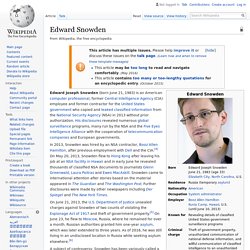
Snowden came to international attention after stories based on the material appeared in The Guardian and The Washington Post. Further disclosures were made by other newspapers including Der Spiegel and The New York Times. On June 21, 2013, the U.S. Department of Justice unsealed charges against Snowden of two counts of violating the Espionage Act of 1917 and theft of government property.[5] On June 23, he flew to Moscow, Russia, where he remained for over a month. Russian authorities granted him one-year asylum, which was later extended to three years. Background Childhood, family, and education Political views Career Employment at CIA Publication. Dark Mail Alliance. Privacy concerns with social networking services. Social networking sites vary in the levels of privacy offered.
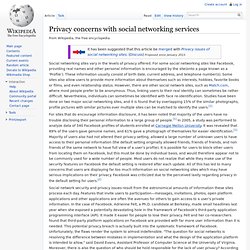
For some social networking sites like Facebook, providing real names and other personal information is encouraged by the site(onto a page known as a ‘Profile‘). These information usually consist of birth date, current address, and telephone number(s). Some sites also allow users to provide more information about themselves such as interests, hobbies, favorite books or films, and even relationship status. However, there are other social network sites, such as Match.com, where most people prefer to be anonymous. Thus, linking users to their real identity can sometimes be rather difficult. For sites that do encourage information disclosure, it has been noted that majority of the users have no trouble disclosing their personal information to a large group of people.[1] In 2005, a study was performed to analyze data of 540 Facebook profiles of students enrolled at Carnegie Mellon University. Peer-to-Peer Social Networking. Personal Genome Project UK. Massive DNA volunteer hunt begins.
7 November 2013Last updated at 00:03 GMT By James Gallagher Health and science reporter, BBC News Scientists are looking for 100,000 volunteers prepared to have their DNA sequenced and published online for anyone to look at.
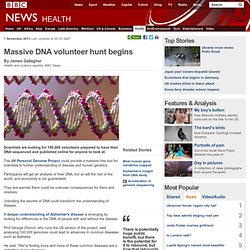
The UK Personal Genome Project could provide a massive free tool for scientists to further understanding of disease and human genetics. Participants will get an analysis of their DNA, but so will the rest of the world, and anonymity is not guaranteed. They are warned there could be unknown consequences for them and relatives. Unlocking the secrets of DNA could transform the understanding of disease. UK - Police National Computer - Read about records on the Police National Computer (PNC) and Police National Database (PND). You are in Human Genetics → Privacy and Discrimination → The UK Police National DNA Database → Police National Computer If you are arrested, your details will be entered on three linked databases: the Police National Computer (PNC) records your arrest and other personal details.
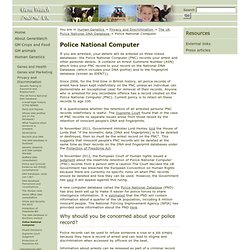
It contains an Arrest Summons Number (ASN) which links your PNC record to your record on the National DNA Database (which includes your DNA profile) and to the fingerprint database (known as IDENT1). Since 2006, for the first time in British history, all police records of arrest have been kept indefinitely on the PNC unless an individual can demonstrate an 'exceptional case' for removal of their records. Anyone who is arrested for any recordable offence has a record created on the Police National Computer (PNC). "Subject Access Request" Obtain personal DNA. Network Obfuscation. Background[edit] Obfuscation may be used for many purposes.
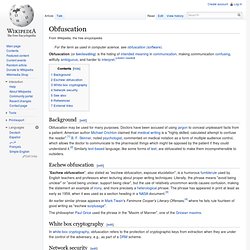
Doctors have been accused of using jargon to conceal unpleasant facts from a patient; American author Michael Crichton claimed that medical writing is a "highly skilled, calculated attempt to confuse the reader".[1] B. F. Skinner, noted psychologist, commented on medical notation as a form of multiple audience control, which allows the doctor to communicate to the pharmacist things which might be opposed by the patient if they could understand it.[2] Similarly text-based language, like some forms of leet, are obfuscated to make them incomprehensible to outsiders. Eschew obfuscation[edit] "Eschew obfuscation", also stated as "eschew obfuscation, espouse elucidation", is a humorous fumblerule used by English teachers and professors when lecturing about proper writing techniques.
The philosopher Paul Grice used the phrase in the "Maxim of Manner", one of the Gricean maxims. White box cryptography[edit] Network security[edit] Netflix.